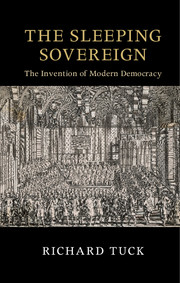Preface
Published online by Cambridge University Press: 05 February 2016
Summary
This book is an expanded version of the Seeley Lectures, which I delivered to the University of Cambridge in May 2012. I would like to thank John Robertson and the History faculty of the university, as well as Richard Fisher and Cambridge University Press, for the invitation to give the lectures, and for their continued help and advice over their publication. Though I have added a significant amount of material, I have chosen to retain the structure that I used originally, namely four chapters on, respectively, ‘Jean Bodin’, ‘Grotius, Hobbes and Pufendorf’, ‘The eighteenth century’ and ‘America’; but I have added a conclusion in which I have briefly developed some of the general implications of what I am saying.
The title of the book refers to a long passage in Thomas Hobbes's De Cive of 1642, in which Hobbes worked systematically through an extensive analogy between a democratic sovereign and a sleeping monarch, a passage I discuss in detail in the second chapter. Remarkably, it is one of the first full accounts of how we might think about democracies to be found in the literature of political theory after the disappearance of the ancient republics, despite the fact that Hobbes was primarily interested in defending the sovereignty of the kings of England. In it, Hobbes argued that a sovereign democracy need not be involved at all in the ordinary business of government; it could simply determine who should rule on its behalf and how in general they should behave, and then retire into the shadows, just as a monarch might appoint a vizier to govern in his place before going to sleep. Government – the prime activity of the ancient democracies, with their constant meetings of citizens to decide all kinds of matters including court cases – need not in fact be the activity of a democracy at all.
This is a graphic image, typical of Hobbes's writings, but he himself did little with it other than offer it as a theoretical possibility to his readers. The person for whom an idea of this kind really mattered was Jean-Jacques Rousseau; indeed, I would argue that as a result of neglecting his use of the distinction we have seriously misunderstood the degree to which Rousseau accepted the practical exigencies of modern politics.
- Type
- Chapter
- Information
- The Sleeping SovereignThe Invention of Modern Democracy, pp. ix - xivPublisher: Cambridge University PressPrint publication year: 2016

